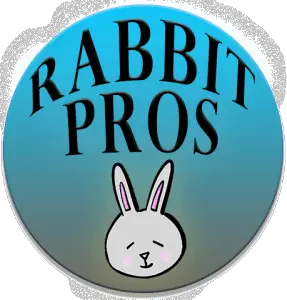Disclosure: We may earn money or products from the companies mentioned in this post.
Your pet rabbit’s teeth are not only adorable, but as you learn more you’re going to agree that rabbit teeth are super interesting.
Let’s start with a shocker…
Rabbits’ teeth have an open root canal which means that their teeth will keep growing their entire life.
Crazy right?
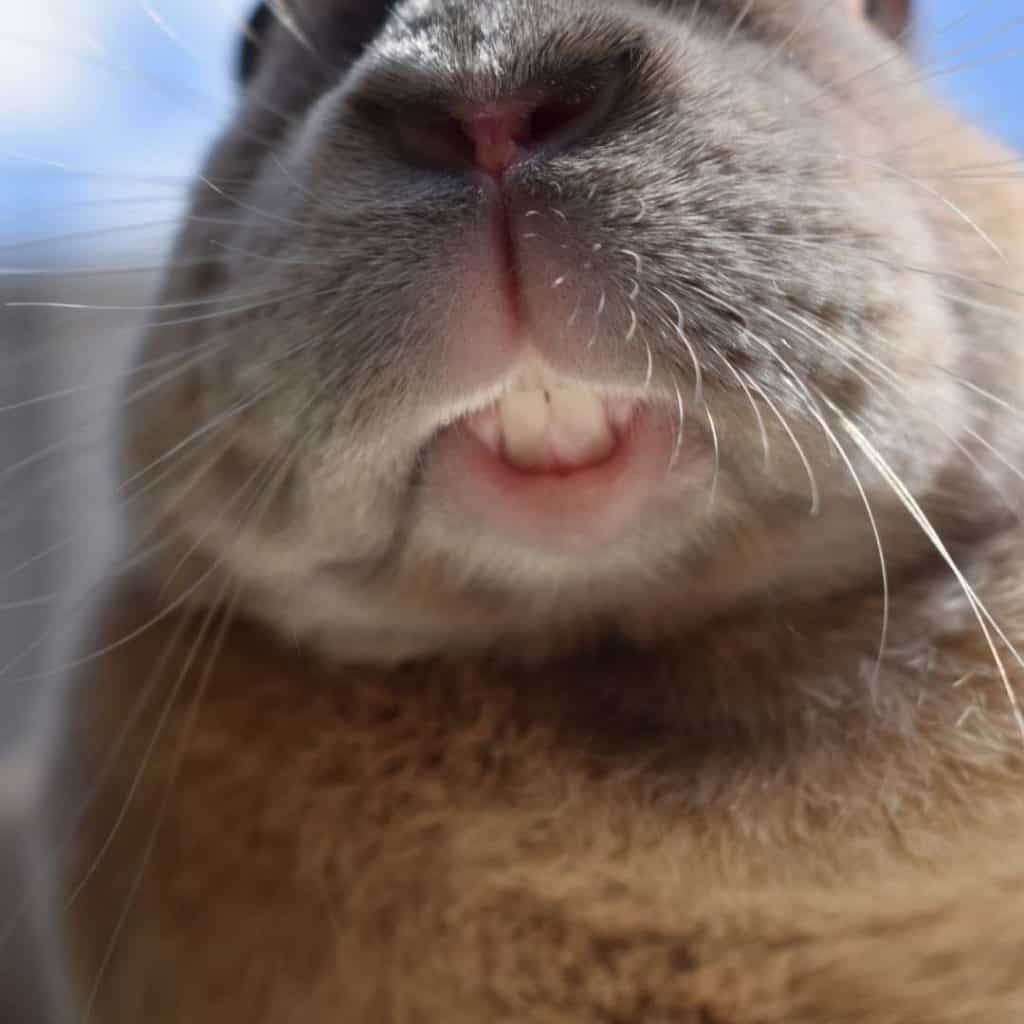
This constant teeth growth is the reason why rabbits are such big chewers. Not only do they just chew their food (a healthy rabbit diet is mostly hay), but chewing also helps keep their teeth worn down to the proper length and in good shape.
In this article, I will be discussing all the interesting facts about rabbit teeth as well as all that you need to know to ensure that those teeth are properly taken care of. I hope that this will serve as a guide for you to provide better care for your cute bunny.
Rabbit Teeth Frequently Asked Questions (FAQ)
Let’s start with the basics.
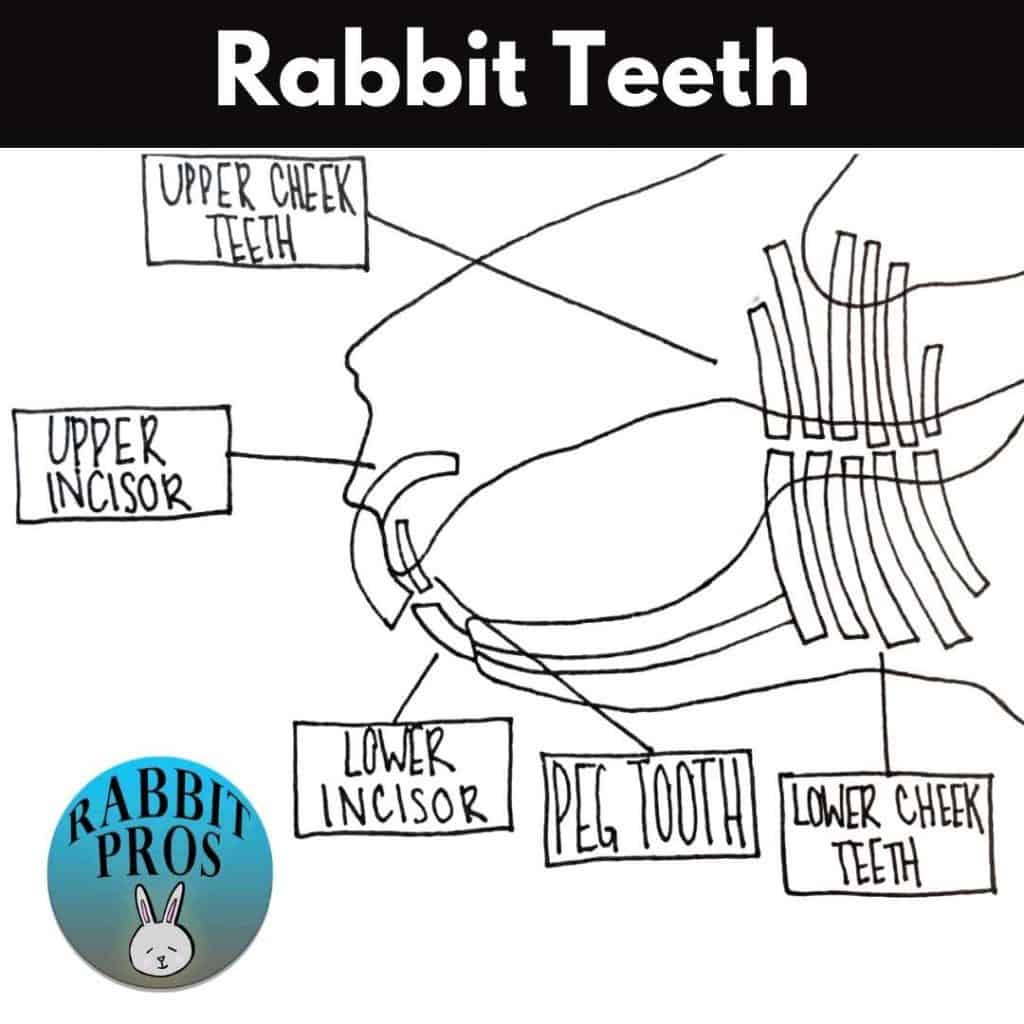
How many teeth do rabbits have?
Rabbits have a total of 28 teeth. They have 16 teeth on the top of their mouth and 12 at the bottom. Rabbits have three kinds of teeth: premolars, molars, and incisors. Their teeth have an open root which means that they will keep growing throughout their lifetime.
Unlike many other pets, bunnies do not have canines because they are herbivores and do not need to tear or chew on bones and tough meat. Their incisors (front teeth) and their molars are located at the back of their mouth.
Another interesting fact about your bunny’s teeth is their composition.
Enamel On A Rabbits Teeth
Bunny teeth have enamel on their front teeth only. While their back teeth are made of only dentin, which is the dense bonelike material that makes up the center of all other teeth.
Because of this difference in material, your bunny’s incisor teeth grow faster than their molars.
Alternative Name For A Rabbit’s Teeth
A rabbit’s rear teeth are technically called molars, but many rabbit breeders and rabbit veterinarians refer to them as “cheek teeth”
Rabbits also have what are called “peg-teeth” which are sub-type of incisors. Rabbits have four incisors on their top jaw. The two long front incisors are the teeth we all think of when we picture a bunny rabbit. Behind those long incisors are two shorter incisors called peg-teeth.
They also have two more incisors on their bottom jaw.
For your rabbit to have healthy teeth, their incisors and their molars have to grow and be worn down at the same rate.
Well-aligned rabbit teeth are when the upper incisors meet the lower incisors perfectly. If their teeth are not aligned, this can cause problems that are not just a mere irritant but can actually be dangerous to the overall health of your pet.
Overgrown teeth can grow into the roof of your bunny’s mouth or grow into their gums. Rabbit teeth are sharp and can cause sores and injuries in the inside of their mouths. This can cause an avalanche of health problems such as lack of appetite, physical inability to eat, and even their teeth getting stuck not only on things they chew on but even stuck on their cages or hutches.
Overgrown teeth are extremely painful. If you have ever experienced a toothache, then you know how uncomfortable it feels. It’s sometimes hard to tell if your rabbit is uncomfortable, this is why rabbit owners should learn to read the subtleties of their bunny’s body language.
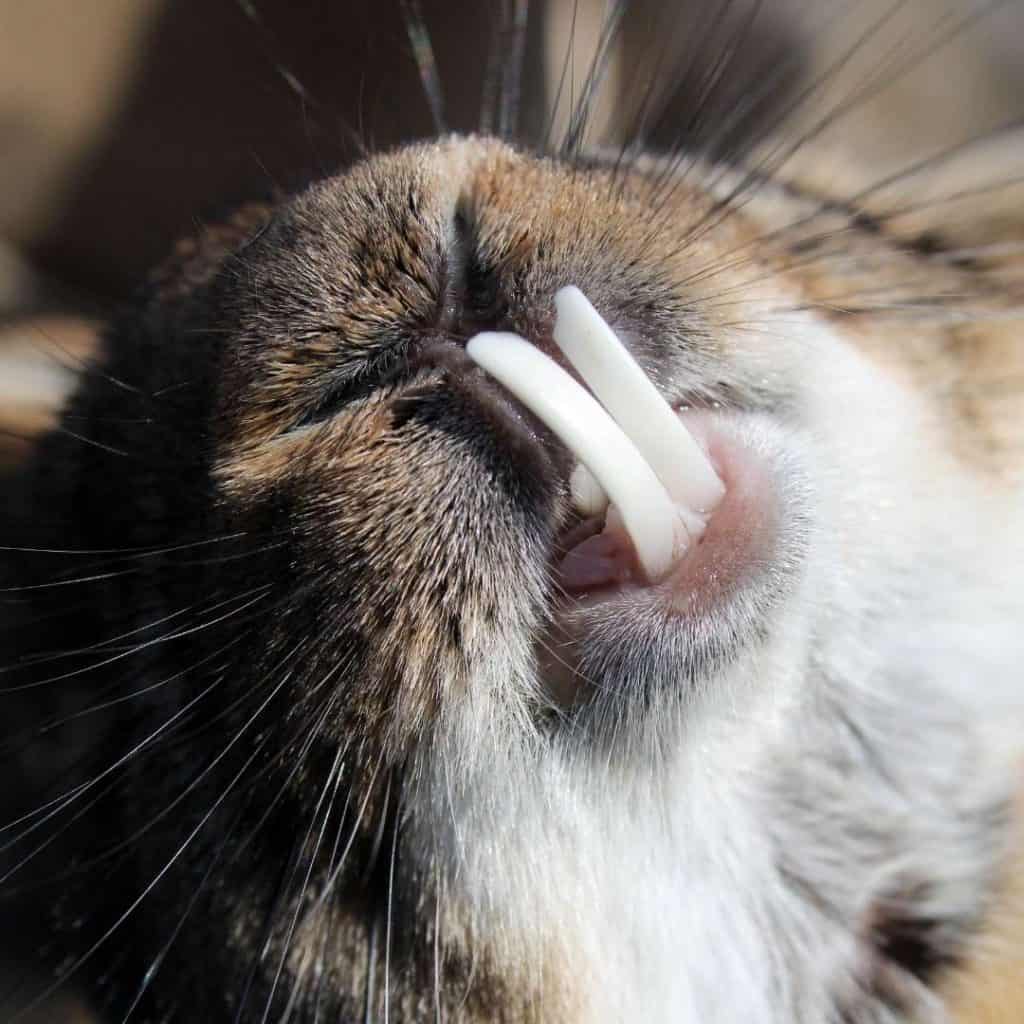
How Long Can A Rabbit’s Teeth Grow?
Dental problems with rabbits are usually caused by overgrown incisors because the front teeth of rabbits grow faster than their molars. Rabbit incisors can grow up to 12 cm a year, though, with a healthy diet, they will also wear down 12 cm a year.
According to a study conducted by Johnson and Burns, Lop-eared bunnies are more susceptible to suffering from dental problems. This study has been confirmed by the Royal Veterinary College (RVC). The dental problems that Lop-eared bunnies experience are said to be caused by the unique shape of their heads.
I know, this might be a sad thing to hear, because lop bunnies like the Holland Lop are some of the most popular pet rabbit breeds. If you look through rabbit-related social media accounts, the chance of seeing a lop-eared bunny is high. It is impossible to resist those lovely ears and fluffy bodies which makes them one of the cutest rabbit breeds in the world.
However, this does not mean that lop bunnies are always doomed to suffer dental problems. Just because they are genetically prone to these ailments does not mean you won’t be able to prevent them. In the next section, I will be discussing the ways you can take to keep your rabbit’s dental health in check.
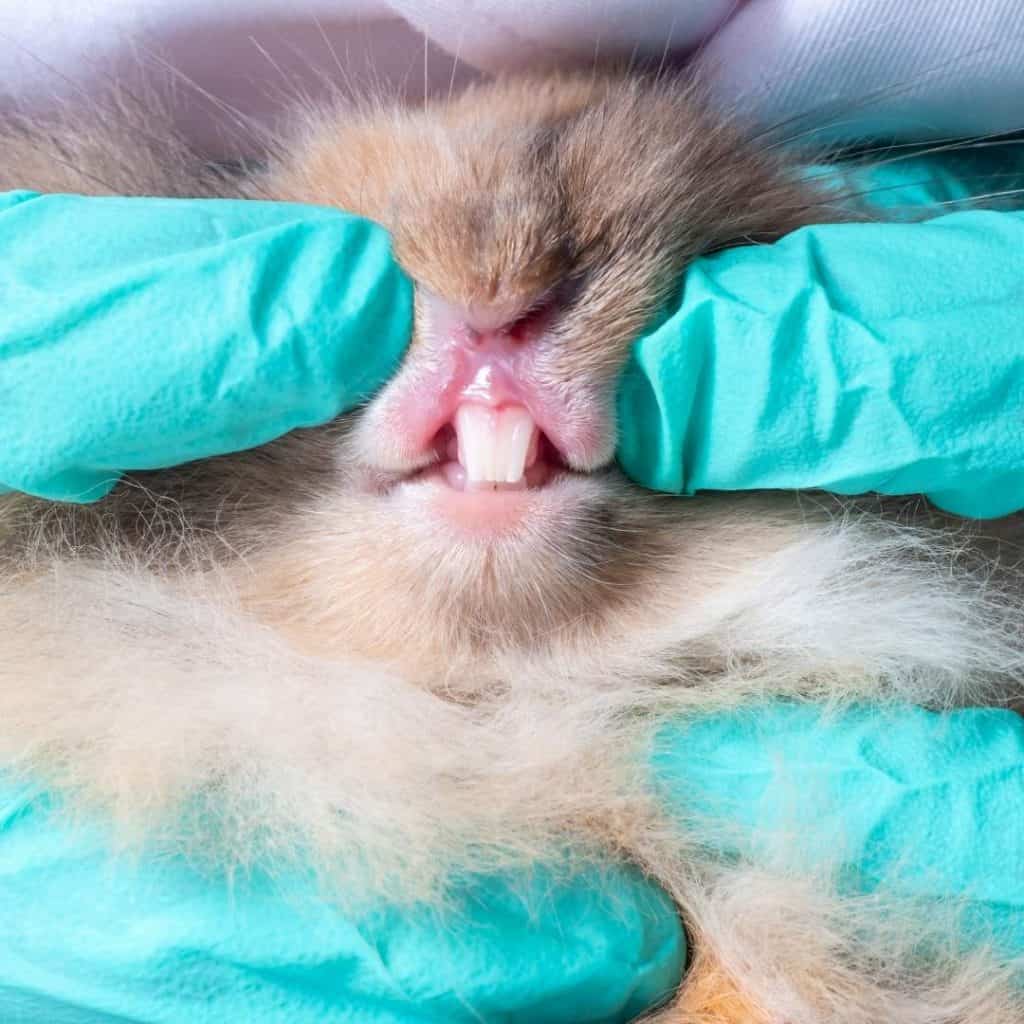
How To Keep Your Rabbit’s Teeth Short
There are simple and easy things that you can do to help keep your bunny’s teeth short, perfectly aligned, and healthy.
1. Feed A High Fiber Diet
Rabbit teeth are specifically made to cater to their herbivore lifestyle. Thus, to be able to keep your rabbit’s teeth healthy, you must make sure that they are provided with a diet that mimics their natural diet in the wild.
It is often a misconception that since rabbits are herbivores they can eat mostly vegetables. But that isn’t true, a rabbit diet should consist primarily of high-quality hay. This is essential for the health of their teeth and their gut.
If you are not sure what you should be feeding your rabbit, here is a link to an article about the Ideal Rabbit Diet written by a rabbit veterinarian.
2. Provide Chew Toys
Rabbits are big chewers. They chew a lot to keep their energy up and to keep their teeth trimmed. Hence, It is important that you also provide them with chew toys that will help them trim their teeth.
Chew toys can be as simple as a stick or as complex as custom-made rabbit chew toys.
If you want to go for DIY rabbit chew toys, aspen, willow, and apple branches are safe for rabbits to chew on. You can also give cardboard to your rabbit to chew on but avoid highly printed cardboard and watch to make sure that your bunny isn’t eating too much of the cardboard instead of just chewing and spitting.
Most rabbits spit cardboard out, ingested cardboard can cause an intestinal blockage as they are not easily digested by rabbits.
You can learn more about free DIY rabbit toys here.
Or you can see the best rabbit chew toys on Amazon here.
Or, if you want to support a local craftsperson, check out the chew toys on Etsy!
3. Monitor Your Rabbit’s Teeth
The sooner you catch your bunny’s teeth problems, the easier the cure, so make it a habit of monitoring your rabbit’s teeth for length and alignment. In our house, checking our rabbit’s teeth is done during weekly grooming sessions.
It’s really a very simple task.
First, you’ll first look that the incisors (front teeth) to make sure that they are aligned (top and bottom coming together evenly. If you check weekly, you’re not going to be shocked by a long snaggle tooth, instead, you’re going to just see that one or more teeth seem to be getting longer than usual.
If you notice a change in your rabbit’s teeth, you’ll first want to up the amount of hay in their diet and reduce the amount of pellets, vegetables, and treats to see if just a higher fiber diet will solve the problem before it gets worse.
If it does get worse, you should consult your veterinarian.
Next, you should lightly rub your rabbit’s jaws looking for reactions to pain. If you see your rabbit reacting in pain, then should consult your veterinarian.
Can You Trim Or File Your Rabbit’s Teeth Yourself
We do not recommend that new rabbit owners trim their rabbit’s teeth by themselves. Instead, you should ask for help from your veterinarian or a very experienced rabbit owner.
Most rabbit veterinarians trim rabbit teeth with a process called burring, which makes use of a rotary tool to grind the teeth down.
Most experienced bunny owners use wire cutters to trim their rabbit’s teeth when necessary, but we do not recommend this for pet owners. You can seriously harm your rabbit and perhaps yourself if you mess up this procedure.
Please, get help to trim your rabbit’s teeth.
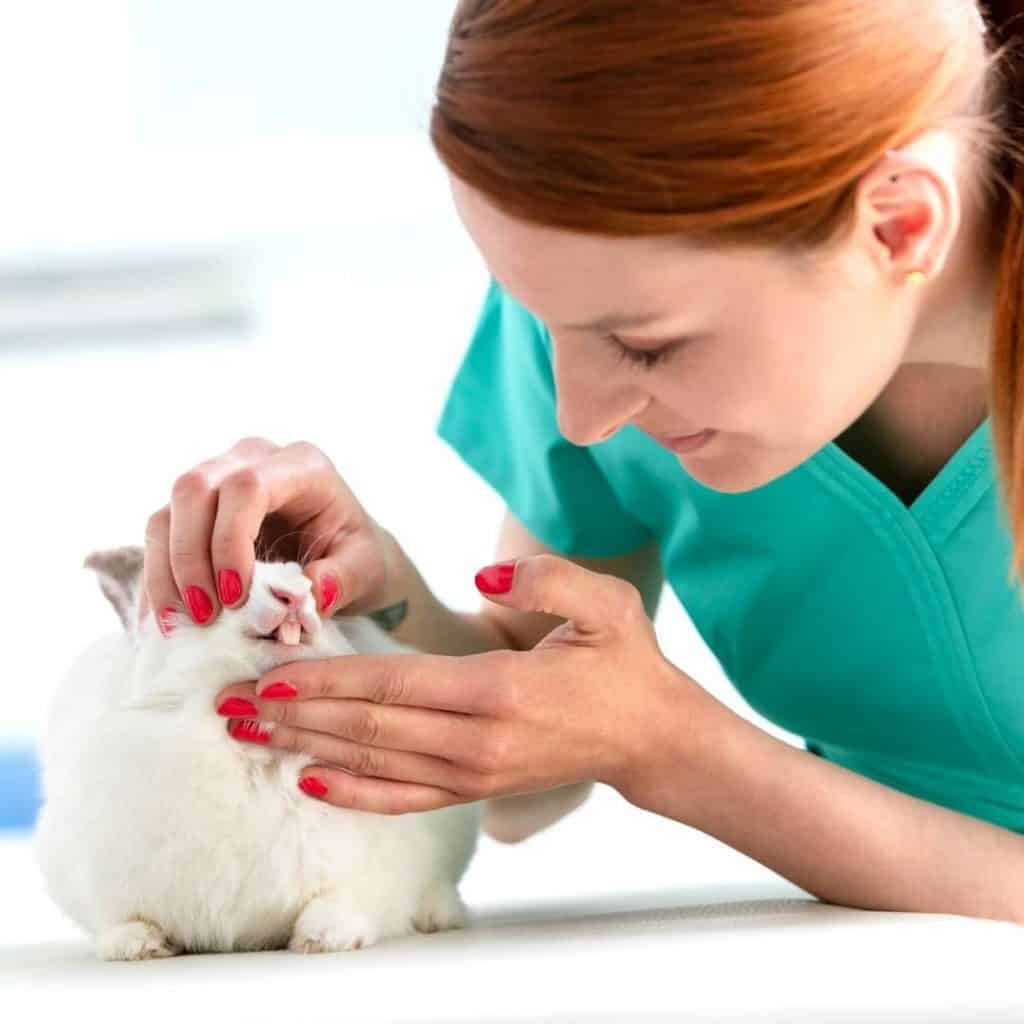
Signs Your Rabbits Teeth Are Too Long
Rabbits are good at hiding their discomfort. This could be a problem if it leads to overgrown teeth that are left untreated for too long. Such problems can lead to a cascade of other health problems that can be fatal to the bunny or at least costly for the owner.
Below are some of the signs to look for when you suspect that your rabbit has overgrown teeth:
1. Lack Of Appetite
Rabbits who have overgrown teeth have trouble eating, which manifests as a loss of appetite.
Not only do overgrown teeth make it hard for a rabbit to chew, but those teeth can also cause wounds on their gums or the insides of their mouth which make chewing painful.
2. Unable To Close Mouth
Long incisors would mean trouble for your rabbits when closing their mouths. This can cause breathing problems for your rabbits and could be fatal in some cases.
3. Loud Teeth Grinding
A rabbit that has too long teeth might loudly grind their teeth in an effort to shorten its teeth.
Please remember that even healthy rabbits sometimes lightly grind their teeth which produces a purring sound, but loud grinding is often a problem of dental problems which means that you need to visit your rabbit’s veterinarian.
4. Teeth Stick In Chew Toys
Your rabbit’s teeth should not be getting stuck on things. If you notice that they are regularly getting stuck chewing their chew toys or they get stuck trying to chew their cages then it means that they have overgrown teeth and would need immediate professional attention.
5. Weight Loss
Since overgrown teeth can lead to a loss in appetite, a weight loss in rabbits is also a sign of overgrown teeth. While there are many other things that can lead to weight loss in pet rabbits, the vast majority of them require a veterinarian’s assistance.
If your rabbit is losing weight, take your bunny to see your vet.
6. Sharp Teeth
Rabbit upper and lower incisors teeth should end in a flat surface that meets perfectly with the opposing incisors. The tips of a rabbit’s upper or lower incisors should not be pointy.
7. Discoloured Teeth
Yellow teeth are not normal for rabbits.
If you notice that your rabbit’s teeth are yellowing then this usually means that those teeth are either too long or you’re not feeding a healthy bunny diet that would naturally clean their teeth as your rabbit chews the high fiber hay that makes up the majority of their diet.
8. Nose Or Eye Discharge
Overgrown teeth can grow into the gums and cause problems in the nasal and eye passages for bunnies which can lead to weird and sudden nose and eye discharge.
Once again, there are also other causes for nose or eye discharge in bunnies, but all of those causes should be examined by a vet.
What To Do If Your Rabbit’s Teeth Are Too Long?
If your rabbit’s teeth are getting too long, the first step is to make sure that your rabbit is eating mostly high-quality hay. You can increase your rabbit’s hay intake by reducing access to pellets, vegetables, and treats.
If your bunny’s teeth are particularly long or if your rabbit is demonstrating other signs of distress such as loss of appetite, pain, or even discolored teeth, then you should immediately take them to visit your veterinarian.

Can I Brush My Rabbit’s Teeth?
There’s no need to brush your rabbit’s teeth. The act of chewing on the hay that makes up the majority of a healthy rabbit diet naturally trims their teeth to the appropriate length. While wearing down their teeth, this high-fiber diet also cleans their teeth and prevents the build-up of cavity-causing plaque and bacteria.
Providing enough hay and chew toys is almost always enough to keep your rabbit’s teeth healthy. If you add to this regular checks with your veterinarian and grooming sessions that include monitoring your bunny’s teeth their chances of dental issues drop even more.
Besides, most pet toothpaste in the market is created for dogs…and even that is of highly questionable usefulness.
